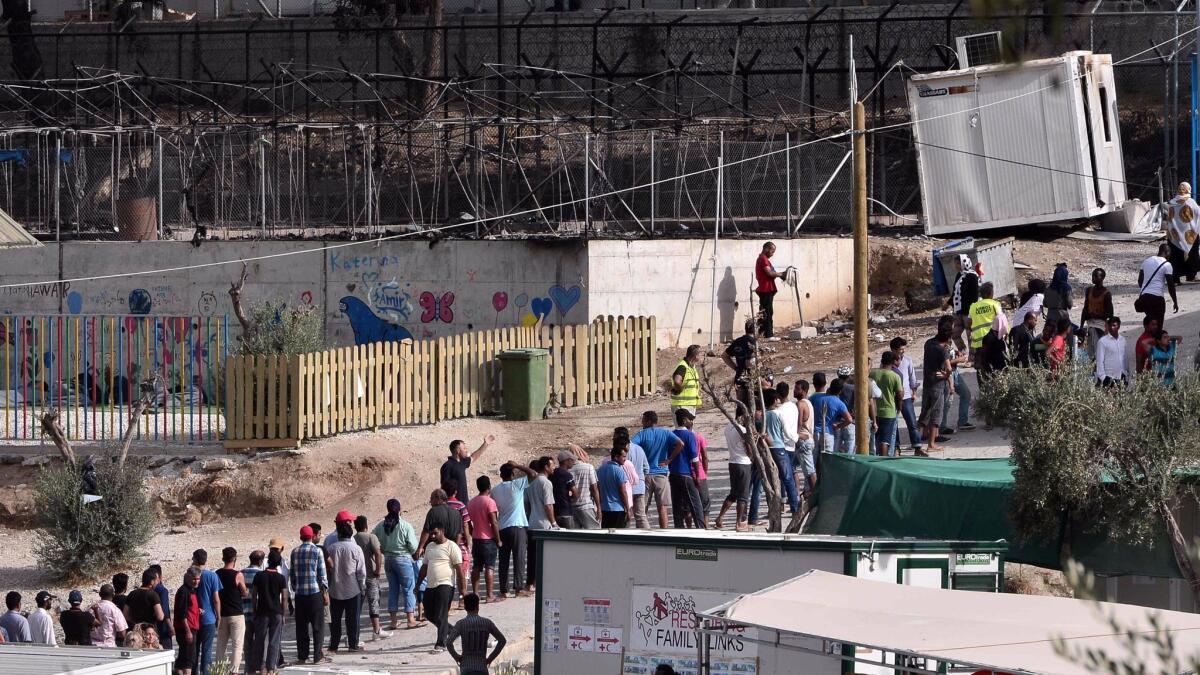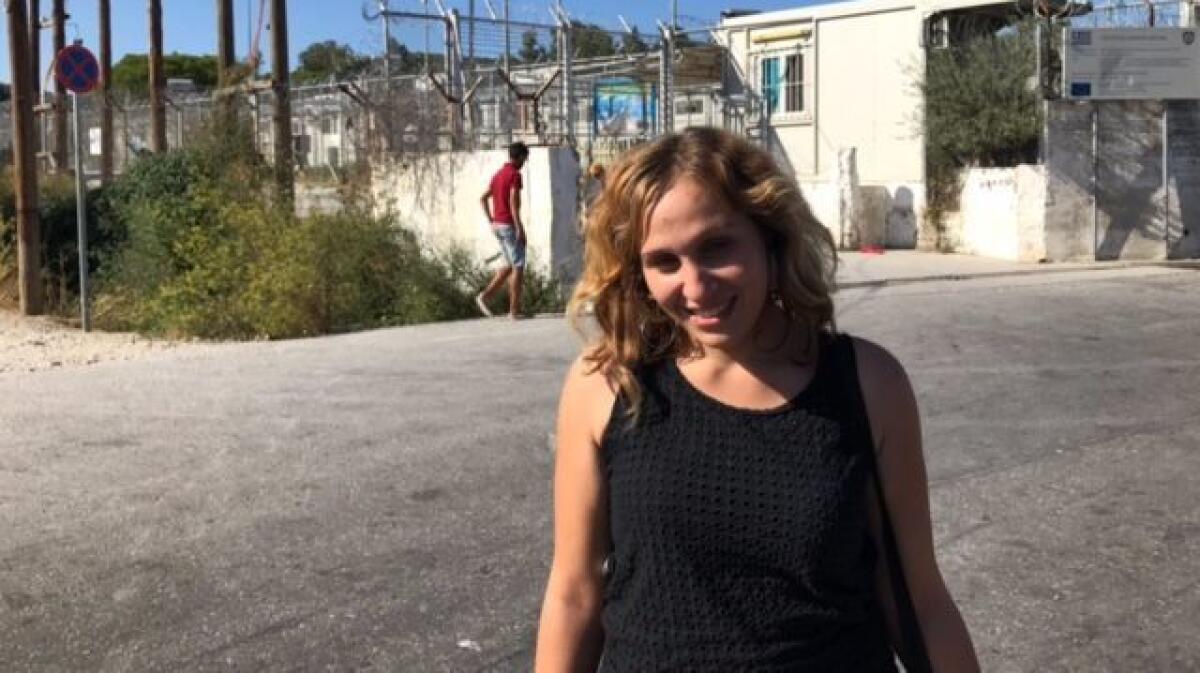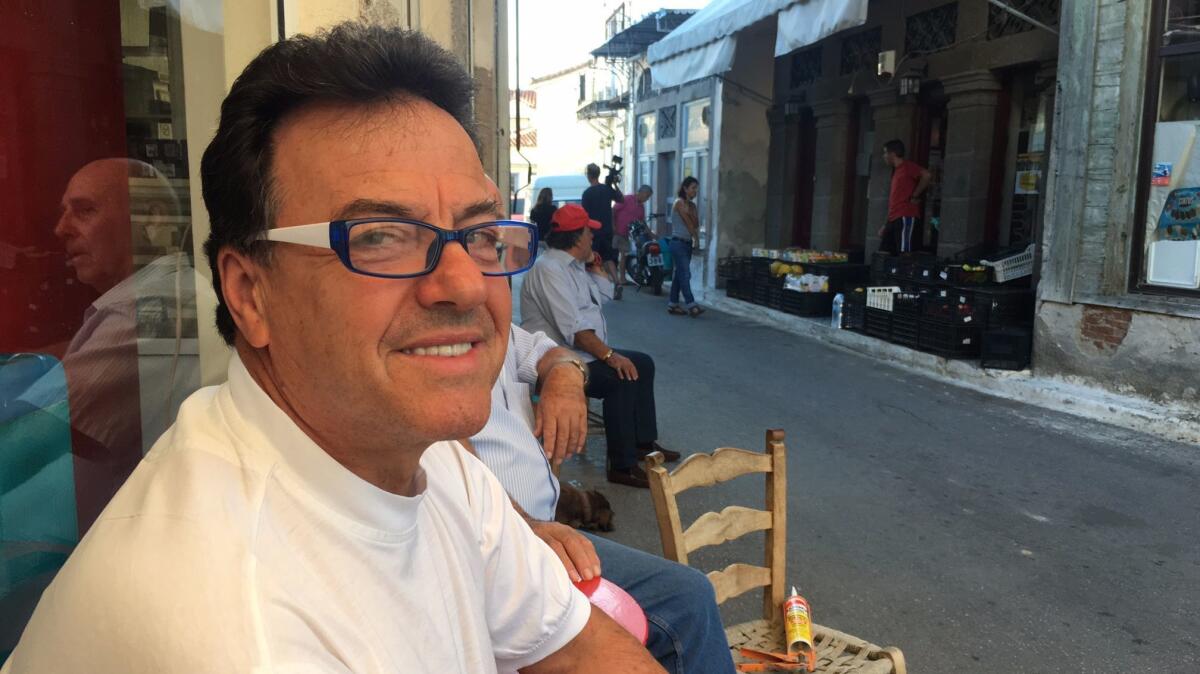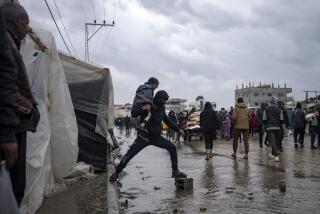Thousands of refugees have been languishing in an overcrowded camp in Greece for nearly two years

- Share via
Reporting from LESBOS, Greece — The stench of human waste, rotting food and dirty, sweat-drenched clothes mixes with the swirling smoke from makeshift campfires. It is lunchtime at the Moria refugee camp, where desperate hopes for a better life have come to this.
More than 3,500 people from the Middle East, Africa and Asia have been stranded in this overcrowded camp on the Greek island of Lesbos for up to 18 months — after surviving perilous Aegean Sea crossings in rickety boats from Turkey, about four nautical miles away.
Here, the dream of quick passage into the European Union has turned into a dead end on the EU’s far southeastern fringe. Those living in the squalor of the Moria camp are the all-but-forgotten flotsam of a refugee crisis that saw more than a million people flood into wealthier EU countries such as Germany, Sweden and Austria before the door was shut in 2016.
Refugees and other migrants have continued to trickle into Europe through Italy and other points, but the Lesbos gateway — which once led through the Balkans to Central Europe — ends here, amid the smoke and squalor.
“This is a dreadful place,” said a Pakistani in his 20s named Yasir, who declined to give his last name. He was in foul mood after his asylum application was rejected. He was told he would be deported a week later to Turkey.
“The food is awful, it’s hot, it stinks,” he added as he swatted away flies inside the sweltering living quarters in a tent he has shared with dozens of other people. “The air conditioning never works and there are often fights breaking out between the different nationalities.”
The dirt floor was covered with rolls of a felt-like carpet material. There were piles of unwashed dishes and buckets of leftover food scattered around the tent.
There are now 6,000 people trapped in two camps in Lesbos who arrived too late to make it farther — after paying huge sums to smugglers to help get them to Greece. In all of Greece, a total of about 60,000 are stranded. The Mediterranean country has been at the front lines of Europe’s biggest refugee crisis since World War II, even as it struggled with its own economic crisis.
A deal between the EU and Turkey in March 2016 helped stanch the flow of migrants amid a rise of anti-immigrant sentiment that swept across much of the rest of Europe. As a result, many of the refugees here will end up being sent back to Turkey once their asylum applications can be processed by local officials. Those who do qualify for asylum — mostly Syrians and Iraqis — also face an uncertain future. Although EU countries agreed in 2015 to accept refugees who managed to reach Greece and Italy, most are resisting.
The number of refugees arriving in Greece dropped 92%, from 152,600 to 11,500, in the first seven months of 2017 compared with the same period in 2016, according to recent figures from the Office of the United Nations High Commissioner for Refugees.
Journalists and visitors are not officially allowed into the Moria camp, which Pope Francis visited last year and later indirectly likened to a “concentration camp.” But some sections of the two-story-high fencing have large holes; refugees slip through to use the surrounding bushes as open-air toilets and outsiders can use them to sneak in.
Garry, a muscular student from Congo who declined to give his last name for fear of jeopardizing his asylum bid, said he would not give up on his dream of reaching Germany or France despite being stuck in Moria for the last year. But for now he was merely hoping to get out of the camp and to the Greek capital, Athens.
“We’re locked up inside this camp and it feels like we’re in jail with high fences everywhere,” Garry said, speaking in French. “We’re not allowed to go anywhere else in Greece. And the Greeks here are racists. They hate black people.”
There have been occasional outbreaks of rioting at the Moria camp, sometimes started by refugees upset that they had just been denied asylum and ordered to return to Turkey, or out of frustration over the poor hygiene conditions and bleak outlook. Or sometimes it is simply tensions erupting between different nationalities. At times, stone-throwing migrants upset with their situation have clashed with local police.
Fires have also broken out at times, sometimes from cooking flames set too close to tents, sometimes in protest of the substandard living conditions. Two large tents and several shipping containers used as temporary housing were burned in one such uprising in July.
Three refugees died in January during a cold snap. Local officials said that they died after inhaling toxic fumes from stoves inside tents.

“I don’t like it here and don’t want to stay,” said Binam, a 27-year-old woman from Syria’s Hama province who left her two small children behind and arrived on her own six weeks ago in search of a better life for her family. Like other migrants, she declined to give her last name, saying she didn’t want to create problems for her children.
“Life in the tents is very bad for me,” she said. “Greece isn’t a good place for refugees. There are too many racists here. I want to go to Germany. As soon as I get asylum, I’ll be out of here.”
Although some local Greeks acknowledge they are fed up with migrants, who have hurt tourism and caused tensions, many still harbor sympathy for the people stuck in Lesbos and wonder why the outside world seems to have lost interest in their plight.
“Nobody seems to care about Lesbos, the refugees and the people living here anymore,” said Natasha Papanikolaou, a 38-year-old who volunteers at refugee camps and considers some of the occupants her friends. “It’s frustrating. The world used to care. But now everyone forgot about us.”
Tensions run higher in the village of Moria, where the 3,500 refugees have more than tripled the population of 1,500.

“The problem is, they don’t have any respect and they stink,” said Sopocles Mantel, 50, who spent 25 years in the United States. “They’re hurting the town and scaring away the tourists. They just throw their plastic bottles and garbage on the ground and if you ask them to pick it up, they ignore you. Some of them set fire to their tents. That’s ridiculous! I give you a place to sleep and you burn it down?”
The presence of so many migrants on Lesbos, an island of 90,000, has taken a toll on local tourism, many residents complain. Hotel operator Sophia Sotraki said business has fallen 40% at her 10-room building since the crisis began in 2015. She worries about what will happen if the backlog of refugees staying in Lesbos continues to rise.
“We used to have 37 to 40 charter flights with tourists arriving every week and that’s down to seven a week right now,” said Sotraki. “Tourists are afraid to come because of the situation. They think the refugees could be hanging around all over the place and it’s dangerous so they go elsewhere.”
Like many Greeks in Lesbos, however, Sotraki expresses sympathy for the migrants. “I understand them and that they want a better life,” she said. “I’d want that too.”
ALSO
A year later, legacy of refugee crisis has Greeks fearing paradise lost
Europe’s migrant crisis threatens to overwhelm Italy, even as flows to Greece dry up
Syria may be in ruins, but it looks like Assad ‘has won the war militarily’
Kirschbaum is a special correspondent.
More to Read
Sign up for Essential California
The most important California stories and recommendations in your inbox every morning.
You may occasionally receive promotional content from the Los Angeles Times.










